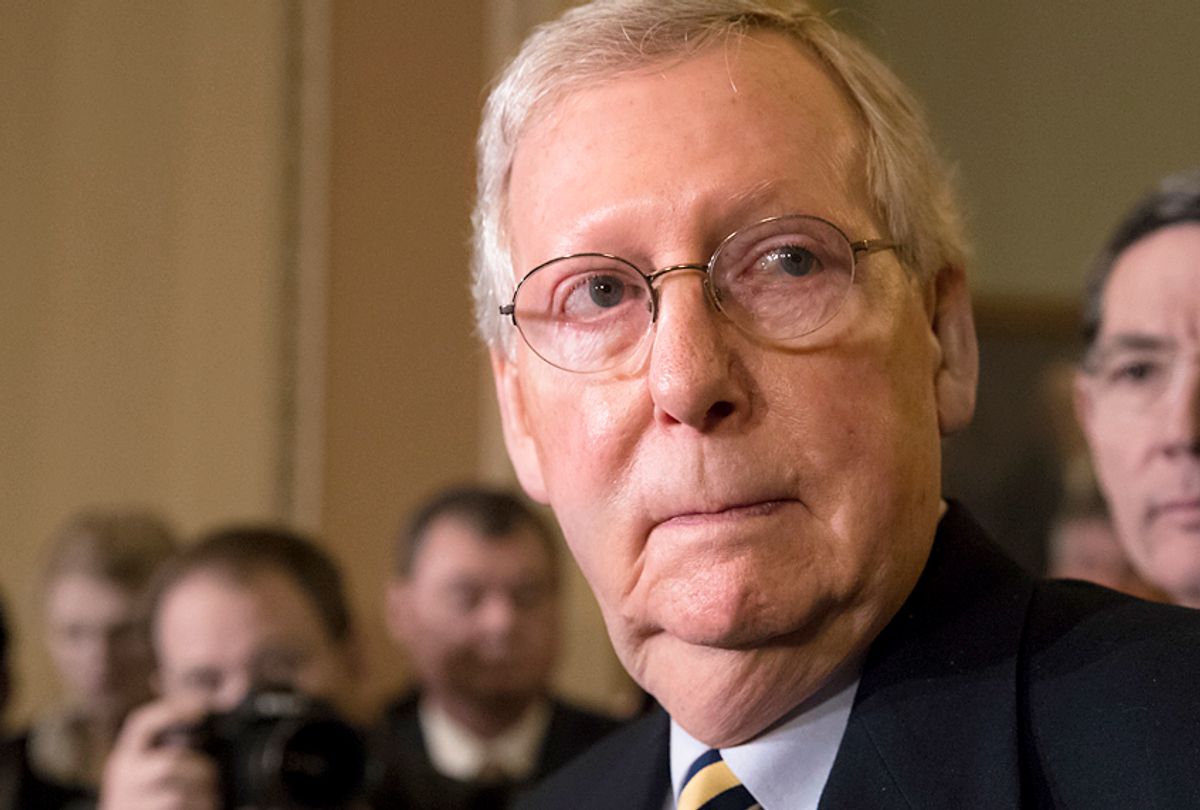When the U.S. Supreme Court, in a 5-4 decision, decided to uphold President Donald Trump's revised ban on travelers from several majority Muslim nations on Tuesday, Senate Majority Leader Mitch McConnell's team tweeted an image of him and Supreme Court Justice Neil Gorsuch. When the high court dealt a major blow to unions representing millions of the nation's public employees on Wednesday, McConnell tweeted a gif of the Kentucky Republican jumping for joy.
For more than six years, conservative elected officials and activists have worked to undercut collective bargaining rights of workers in an effort to weaken the union movement in the U.S. When the court last considered whether state government workers who choose not to join a union can be required to pay some fees to unions that represent them in 2016, it deadlocked 4-4, shortly following the death of conservative Justice Antonin Scalia.
Since then, thanks in large part to McConnell's efforts to block former President Barack Obama's nominee Merrick Garland for 11 months, conservative Neil Gorsuch has joined the court, providing the fifth vote workers' rights opponents needed to rule against the fair share fees. Gorsuch was in the majority on Wednesday.
The justices said in a 5-4 opinion that compelling workers to pay union dues is a violation of the First Amendment.
"States and public-sector unions may no longer extract agency fees from non-consenting employees," Justice Samuel Alito said in his majority opinion for the court's five conservative justices.
The case, Janus v. American Federation of State, County and Municipal Employees, No. 16-1466, was filed by Gov. Bruce Rauner, a Republican. He was eventually dropped from the litigation, but Mark Janus, a child support specialist who works for the state government in Illinois, continued the fight. Janus sued the union, saying he does not agree with its positions and should not be forced to pay fees to support its work. He claimed the dues requirement violated his freedom of association.
Public sector unions argue that the ruling, a break from longstanding court precedence, will diminish their source of income and their political clout in the 23 states where they bargain for both members and non-members alike. A recent non-partisan study estimated that public employee unions could lose more than 700,000 members over time as a result of the decision and that unions could also suffer a loss of political clout that could depress wages. Nearly half of all union members in the U.S. are government employees.
"There is no sugarcoating today's opinion," Justice Elena Kagan said in a fierce dissent she read from the bench. "The First Amendment was meant for better things. It was meant not to undermine but to protect democratic governance — including over the role of the public-sector union."
"By requiring unions to represent everyone in a collective bargaining unit without ensuring fair contributions for that representation, unions will be forced to do more with much less — to the detriment of those they represent," said Rep. Linda Sanchez, D-Calif., an International Brotherhood of Electrical Workers union member and former union lawyer. "The decision today is the latest blow in a decades-long, nationwide effort by conservatives to bust unions that advocate for workers and protect them from employer abuses."
Newly elected Democratic Congressman Conor Lamb of Pennsylvania also spoke out against the court's decision.
"Today's Supreme Court ruling in Janus v. ASCME is the product of wealthy, powerful anti-union extremists who don't want workers to have a seat at the table and fundamentally believe they don't deserve one," the Democratic congressman, who is running for re-election, said. "No Supreme Court decision can divide us. And no amount of money can defeat working people who are united, organized, and determined to demand their seat at the table," he continued.
Several pro-workers groups came out against the decision as well.
"The decision today made by the US Supreme Court in the Janus v. AFSCME case marks a victory in the decades-long Republican campaign to undermine the labor movement," Patriotic Millionaires, a group that includes hundreds of America's wealthiest citizens, said in a statement. "Unfortunately though, it is a victory for everyone except the American worker."
"This is an assault on the labor movement, full stop, and should not be commemorated as anything less," the organization concluded.
Celine McNicholas, the Economic Policy Institute's director of labor and policy, said the decision will have "profound implications" for "every working person throughout the country."
"Today, these billionaire-backed organizations finally got their decision, succeeding in advancing an agenda that weakens the bargaining power of workers," McNicholas said in a statement. "The result will be a reduction in state and local government workers' wages and job quality as well as in the critical public services they provide."
She noted that the decision will "lead to greater instability in state and local workforces" and will have similar effects of the recent teachers' strikes in states like West Virginia and Oklahoma.
"As more workers are forced to resort to tactics outside of traditional collective bargaining to preserve their wages and benefits, they will do so under the court’s newly conceived First Amendment doctrine, which will undoubtedly evolve in the coming months and years as additional cases are filed challenging its outer limits."
For his part, President Donald Trump joined McConnell in gloating on Twitter after the ruling:

Shares